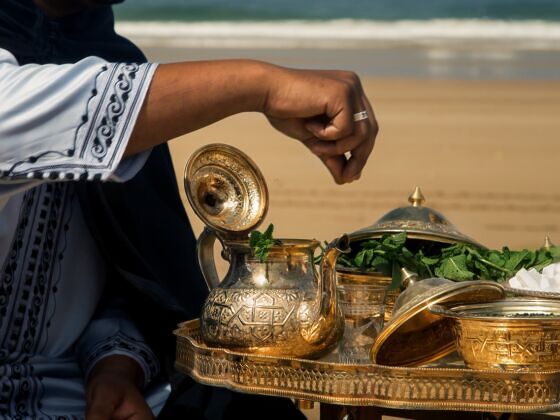“RACHID’S FATHER died in his sleep four nights ago,” my neighbor Fatima told me as we hung laundry on our rooftop. She pulled a damp teddy bear from her pail, pinning it to the line by its oversized ears. “You should pay your respects. That’s his house, just there.” She pointed to a crumbling riad split into apartments, where a curtain hung before a blue tin door.


But I barely knew Rachid and I’d never met his father. For three months I’d been living in the dusty maze of the Fez medina, where Rachid made the rounds with his donkey, collecting trash.
Like many of my neighbors, he was concerned to learn I was living alone. He’d stop to chat while the long-lashed mule snacked on garbage (its commission, I figured). Sometimes Rachid brought treats from his wife: makrout with dates and honey, or ktefa sweetened with almonds and cream.
“How are maman and papa?” he’d asked the week before. The donkey nosed the ground and, finding the corner of a biscuit, chewed happily. I told him they were well. “The most important thing in life, c’est la famille,” Rachid replied easily. “Nothing more important than family.” He tugged the donkey forward. It let out a mighty sigh and Rachid grinned at me over his shoulder as they made their way up the road.
At Fatima’s advice, I went to Rachid’s the next day. The street smelled of the nearby tanneries, heavy and sour. A vendor sold rosewater in green glass bottles, and little boys passed a soccer ball over the uneven stone.
Rachid opened the door unshaven, stubble grazing his hollow cheeks. Seeing me, his face melted into a smile. “My friend! Marhaba, come in, come in.”
“So sorry for your loss,” I mumbled.
“Yes,” he shook his head, “he’s at peace, inchallah. Please sit.” He gestured to a red couch piled high with satiny pillows. I took a seat and he disappeared into the kitchen.
A wide-eyed toddler wandered out, sucking on a soft rind of preserved lemon. She paused to consider me, then climbed up and laid her solemn head on my lap. Rachid returned with a gleaming teapot and ruffled the toddler’s golden curls. “My granddaughter,” he said, “My little heart. She cries every night since the death.” He smiled, his eyes moist with tears.
Leaning forward, he spooned dry leaves into the pot and added water. We let it steep. The tea ceremony is not efficient — an anxious American friend once called it a form of entrapment. Rachid added sugar and fresh mint before filling our glasses, raising the pot to create foam. “Bismillah,” he said as we drank. “They say the last glass is gentle as death.” The green leaves fluttered lazily in the hot water.
As the sun set, his wife and teenaged daughter came in. They kissed me on both cheeks, enthused as if I’d come from abroad for this very occasion. His wife asked me to stay for dinner and moved to the kitchen, her back to us as she chopped carrots and zucchini.
Rachid’s daughter sat by the window, peeling oranges and lining up their rinds. Slowly, she poured oil into each of the peels and lit their cores, forming a row of scented candles.
My entrapment couldn’t have been sweeter. “I hope you don’t mind the visit,” I said, “I wasn’t sure if you’d want to be alone.” Rachid paused mid-sip and looked at me, quizzical.
“Why would I want to be alone?”